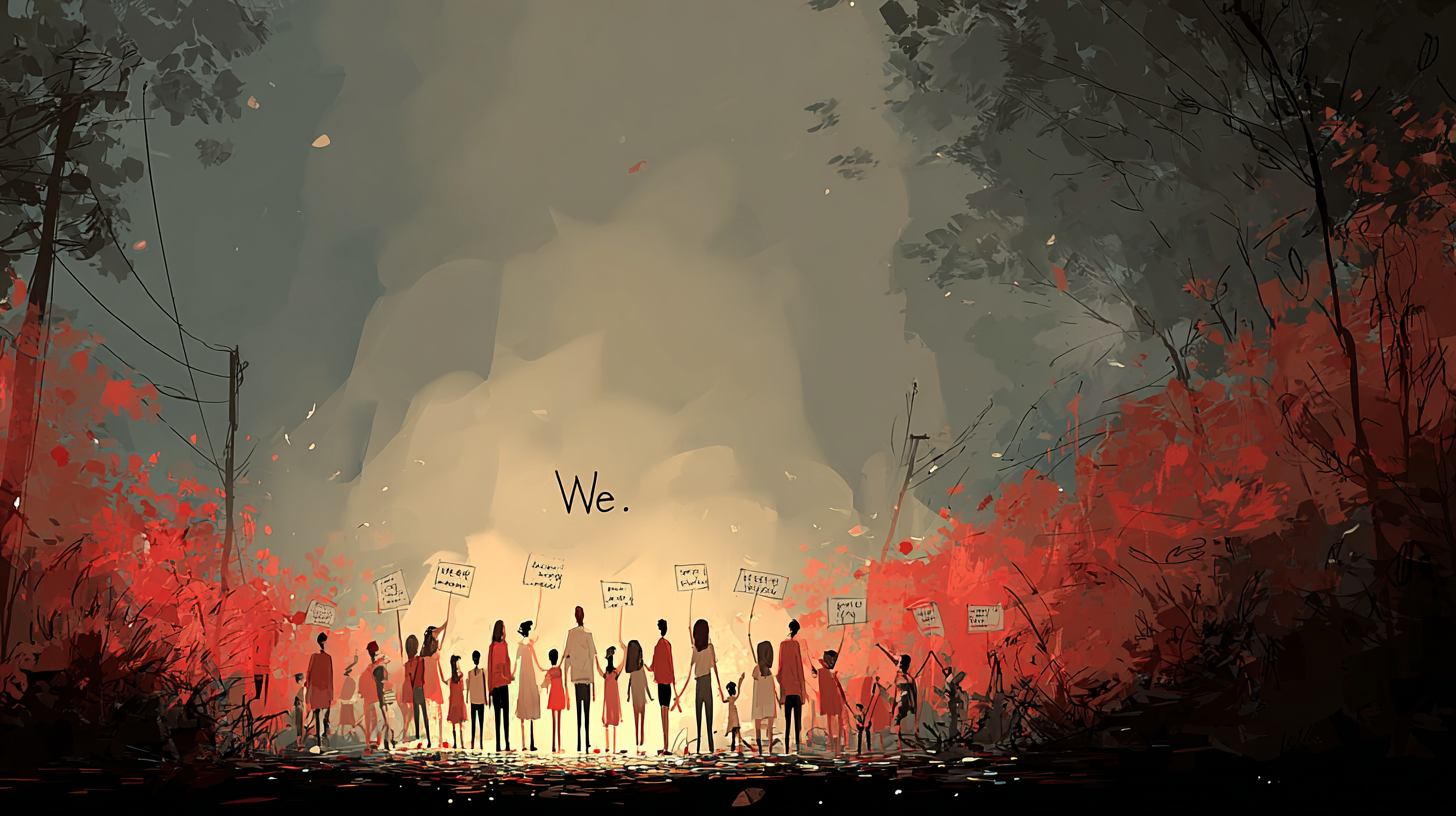“We” means “me and other people together.”
「we」は「私たち」という意味で、自分を含む複数人を指します。
以下は英単語 “we” に関するストーリー型学習コンテンツです。まずは大枠の意味を理解して最後の文章で確認しましょう。
主な意味(main meaning)
| 品詞 | 意味 | 発音記号 | 例文 |
|---|---|---|---|
| 代名詞 (pronoun) | 私たちは(が) | /wiː/ | We are going to the park after lunch. |
語源(etymology)
「we」は古英語「wē」に由来し、さらに古ゲルマン語「*wiz」までさかのぼれます。自分を含む複数人を表すというコアのイメージがあります。
類義語(synonyms)
| 類義語 | 例文 |
|---|---|
| us | He gave us a big surprise. |
| our group | Our group is planning a trip next month. |
| all of us | All of us enjoyed the movie. |
| the team | The team worked hard on the project. |
反義語(antonyms)
| 反義語 | 例文 |
|---|---|
| you | You are welcome to join us. |
| they | They are not coming with us. |
コロケーション(collocations)
| コロケーション | 例文 |
|---|---|
| we are | We are happy to help. |
| we will | We will see you tomorrow. |
| we have | We have a lot to do today. |
| we can | We can finish this together. |
| we should | We should take a break. |
2項表現(binomials)
| 表現 | 例文 |
|---|---|
| you and we | You and we must cooperate. |
| we and they | We and they share the same goal. |
英語ストーリー(english story)
Title: Working as a Team
On Monday morning, our team arrived early at the office. We were preparing for an important presentation to a new client. Everyone had their tasks. Some were making slides, others were checking data. We worked hard together.
At first, I was nervous. But when I saw how well we were cooperating, I felt better. Our group leader said, “We can do this if we support each other.” That gave us confidence.
By 10 a.m., we were ready. We had practiced our lines and made sure everything was perfect. When the client arrived, we greeted them with a smile. The presentation went smoothly. All of us were happy and proud.
After the meeting, the manager said, “You and we did a great job today.” That made us smile even more. It was a clear example of teamwork and what we can achieve when we work together.
和訳
タイトル:チームとして働く
月曜日の朝、私たち(we)のチームは早めにオフィスに到着しました。新しいクライアントへの大事なプレゼンの準備をしていたのです。みんながそれぞれの仕事をしていました。スライドを作る人もいれば、データをチェックする人もいました。私たちは一緒に一生懸命働きました。
最初は私は緊張していました。でも、私たち(we)が協力しているのを見て安心しました。リーダーが言いました。「私たち(we)はお互いを支えればうまくいくよ」。それが自信になりました。
午前10時までに準備は完了しました。セリフを練習して、すべてが完璧であることを確認しました。クライアントが到着したとき、私たちは笑顔で迎えました。プレゼンは順調に進みました。私たち全員(all of us)が満足し、誇りに思いました。
会議のあと、マネージャーが言いました。「あなたたち(you)と私たち(we)は今日はよくやったよ」。それを聞いて、さらに嬉しくなりました。これはチームワークのよい例で、協力すれば何でもできると感じた日でした。
Q&A
Q: 「we」と「us」の違いは?
A: 「we」は主語として使われ、「〜は」「〜が」にあたります。一方、「us」は目的語で、「〜を」「〜に」にあたります。
例:We like pizza.(私たちはピザが好きです)
He saw us.(彼は私たちを見ました)
Q: 「we」と「our group」の違いは?
A: 「our group」は「私たちのグループ」で、より具体的に「グループ」という単語が入っています。「we」は単に「私たち」で、一般的です。「our group」はフォーマルな文や状況でよく使われます。
Q: 「we」と「all of us」の違いは?
A: 「all of us」は「私たち全員」という意味で、強調表現です。「we」よりも「全員で」というニュアンスが加わります。
例:All of us agreed.(私たち全員が同意しました)
Q: 「we」と「the team」の違いは?
A: 「the team」は「チーム」という単語を使っているので、所属集団を強調します。「we」は会話の中で「自分を含む集団」を示す一般的な代名詞ですが、「the team」はその集団がどのようなものか明確にしたいときに使います。
Q: 「we」と「we are」「we will」などのコロケーションの違いは?
A: これらは「we」と動詞を組み合わせた表現です。それぞれ文の時制や意味が変わります。
- we are:現在の状態を表します。例:We are happy.(私たちは幸せです)
- we will:未来の予定や意思を表します。例:We will go.(私たちは行きます)
- we have:所有や経験を表します。例:We have a meeting.(会議があります)
- we can:能力や可能性を表します。例:We can help.(手伝えます)
- we should:義務や提案を表します。例:We should study.(勉強すべきです)



コメント